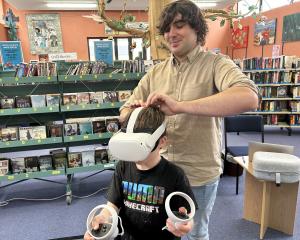
Video-gamers be warned. The following information might prompt palpations, salivation or, at the least, a reflexive twitching of fingers more familiar with the vagaries of various hand-held controllers.
The thing is, Pippin Barr gets paid to talk about video games ... (little spasm). And when he's not discussing games, teaching others about game design (bigger spasm) or designing his own (constant tic), Barr is often to be found playing them (shudder).
Barr writes a daily blog on video games, and in his spare time he makes them. His latest creation, The Artist Is Present, re-creates a famous work of performance art at New York's Museum of Modern Art.
The game attracted plenty of international media attention when it was released in September, stories appearing in a range of high-profile publications, including The Village Voice, The Huffington Post, Slate and Der Spiegel.
This weekend, however, it is Barr's own words that take precedence as New Zealand publisher Awa Press releases his book, How to Play a Video Game, as part of its Ginger Series, a line of titles that roams from the enjoyment of classical and pop music, to fishing, art appreciation, bird fancying and elsewhere.
Although its title might suggest a blow-by-blow account of how to beat those increasingly complex computers, How to Play a Video Game is no how-to guide. Rather, it's both an attempt to demystify the world of video games for non-players as well as a thought-provoking, sometimes philosophical read for players keen to know more about the cyber universe with which they are familiar.
Not only is Barr an avid game-player, he also possesses a scholarly understanding of how such games affect our lives.
Having completed a degree in computer science at Victoria University several years ago, Barr embarked on a PhD on "video-game values", exploring the ways human values are promoted, both overtly and subtly, in the games we play. In Copenhagen he teaches courses focusing on experimentation within video-game design. His wife, Rilla Khaled, is also an expert on video games and an assistant professor at the Centre for Computer Games Research.
Thus Barr offers an interesting perspective on a global industry that, according to Gartner Research, will earn more than US$74 billion ($NZ96.7 billion) this year.
"I didn't use the PhD as a specific touchstone for the book but that is a big part of how I think about games - this relationship between a person and the game," Barr explains from Copenhagen earlier this week.
"I think you can get deep and philosophical about games because you do engage with them. A terrible movie is often just a terrible movie; you can't do anything about it. But a terrible game can still be an interesting experience because of what you can bring into it yourself."
In other words, passivity is not an option for those who consume this form of media.
"That's what terrifies some people about games. There are issues with this idea of you suddenly being out of control and doing these things but that's what makes games so powerful as well."
As the video-games industry grows ever larger, ever more profitable (at least for those mainstream companies that produce blockbusters of the gaming world such as the Call of Duty series, Halo or Lego: Harry Potter, to name a few) so, too, should the depth of debate, Barr contends.
"There are a lot of amazing voices about games. There is a very deep discourse but it doesn't tend to hit the mainstream because not everybody wants to read that kind of thing. The perception of games still hovers around the question of whether they are trivial or an important media.
"Through the passage of time, this will change as more people grow up with games. But there needs to be this twin movement: people talking about games in interesting ways and people making games that aren't like the mainstream releases that get all the media attention."
In the video gaming world, morality need not be confined to a series of on-screen actions, Barr says. In regards more violent games, more pertinent than the question of whether to shoot (or not) that zombie/soldier/fellow gangster is whether to partake in it in the first place.
"I like the idea that as games mature we take more responsibility for our engagement. And that doesn't just have to be the decision not to play a game because it is objectionable. There might be intermediate stages: here I am playing this game and I'm presented with a situation that I want to handle in a way that I feel is appropriate.
"Some of that relies on a game providing an alternative scenario - a lot of times you have no choice but to do something bad. As games develop so, too, do players.
Hopefully, players will advocate for those possibilities.
"The typical argument you'll hear from your average gamer is that it is fine to do whatever in a game - whether that's stabbing someone to death or hitting a young woman in a nightclub - precisely because the game allows you to."
In his book, Barr claims it's "undeniable" that watching or participating in a video game that features prostitutes being beaten to death or shooting soldiers in the back does not feel like harmless fun.
"Such games will make most people feel deeply uncomfortable. We don't have to play games that make us feel that way, nor let our children play them, and most individuals will have their own line in the sand."
Yet Barr is not campaigning for stiffer censorship.
He points out that for every Craig Anderson (an American professor of psychology who claims to have demonstrated that violent video games increase aggression in those who play them), there is contradictory research, such as that by British psychology lecturers Simon Goodson and Sarah Pearson, who found that children showed some increase in aggression from a soccer simulation game but little or none from the violent game Gears of War 2.
Goodson suggests this is because they can connect soccer to their real lives, and thus empathise strongly with their on-screen experience, while the violence in Gears of War 2 is disconnected from their life experience and so doesn't register in terms of aggression.
"Craig Anderson's work is interesting. He is certainly on a crusade but I think it is great we have people who are pursuing this side of the argument.
"There is some evidence that some games do increase aggression, which is not the same thing as it meaning people will then go out and stab somebody. There is a huge difference between a game that increases your adrenalin and so forth versus actually mimicking behaviours that take place in a game," Barr says.
"At the same time, there can be a lack of critical thought from those who like games.
"We need to think about what is being portrayed here; what does it mean? After shooting the 25th person in the head and seeing blood spurting out of them, I wouldn't go out and do the same in real life, but the significance of the experience is something to consider."
Violent games might make headlines but there are plenty of titles whose survival in the marketplace doesn't depend on the destruction of various digitised friends or foes.
Some, such as 2009's Machinarium, which involves guiding a robot through a series of increasingly quixotic scenarios, are "achingly sweet", Barr says. Others, such as The Sims, which offers players the chance to create their own narrative, can be highly amusing.
The bigger point of How to Play a Video Game is not unlike many of the games Barr dissects: it is about shared adventure, a world (or worlds within worlds) of created identities (aka avatars), co-operation, fun, fantasy and friction in equal measure.
Video games can even be a force for good, Barr says, pointing to studies into the fast-paced Super Monkey Ball that indicated surgeons who played the game showed 37% fewer errors and 27% more speed during operations. Elsewhere, the Mind Research Network in Mexico found that playing the classic puzzle game Tetris enhances brain efficiency.
As for his own game, The Artist Is Present, Barr says his aim was to create a playful experiment. In contrast to the many games offering increasingly wild escapism, Barr offers the drudgery of standing in a museum queue.
Recently described by Slate magazine as "subversively boring", The Artist Is Present simulates the experience of waiting in line to see contemporary artist Marina Abramovic, who held an exhibit at the Museum of Modern Art in New York in 2010.
Abramovic's show of the same name, which involved lengthy waits for the chance to sit across from Abramovic and look into her eyes for as long as you wanted, garnered no shortage of media attention. Likewise, Barr's digital re-creation is filling news columns.
"Actually, I did an interview with a Brazilian newspaper last night so I have been talking about it recently. I think 'playful' is an excellent way to describe it.
"One of the things I try to show my students is the various ways people express themselves.
"As I was talking to them about Marina Abramovic, I was thinking that clearly a game mimicking someone sitting in a chair looking into someone's eyes would be funny. I ran with it from there."












